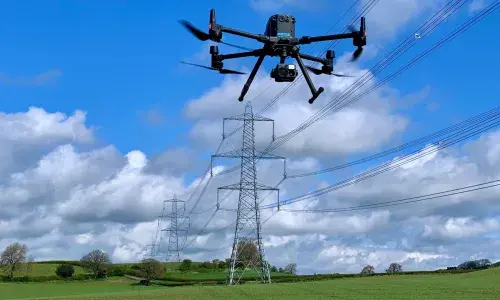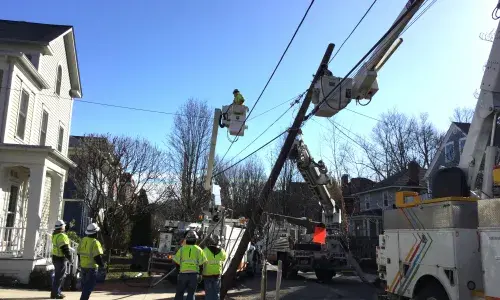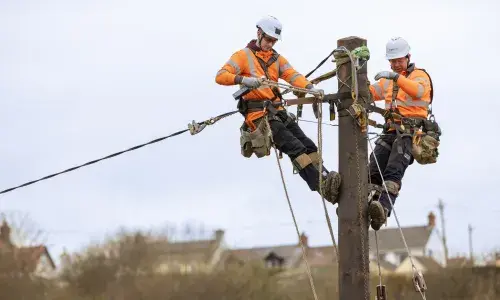
4 things about National Grid's role in our renewable energy future
In the run-up to the eagerly anticipated global climate change summit COP26, UK Executive Director Nicola Shaw and US President Badar Khan explain what we’re doing to tackle climate change now and in the future.
Their conversation took place during a recent event hosted by the British Consulate-General Boston, Greentown Labs and the Consulate General of Italy in Boston, entitled ‘Climate Action New England – Road to COP26’. The UK is partnering with climate leaders globally to host regional events to move the needle on climate action in preparation for COP26, of which National Grid is a principal partner. In the US, National Grid is the headline sponsor of Climate Week NYC in September.
1. Renewable energy and our role.
Nicola: “In the UK, our current focus is two-fold – firstly, we’re working to enable wider decarbonisation of the economies where we operate and, secondly, we’re getting our own house in order.
“To reach our own company target of net zero by 2050, we’re making big engineering and strategic changes. In the UK, we’ve set a target to achieve carbon neutral construction by 2026 on all major projects. And the Electricity System Operator has committed to be able to fully operate Great Britain’s electricity system with zero carbon by 2025.
“Our engineers are also working on solutions such as unlocking the opportunity that the North Sea provides via renewables.
“We’re collaborating on hydrogen innovation projects to repurpose our existing network; we have hydrogen blending studies taking place in both the UK and US, to explore the performance and use of our existing gas infrastructure as we transition to hydrogen.”
Our engineers are working on solutions such as unlocking the opportunity that the North Sea provides via renewables.
Badar: “Utilities have a large role to play in encouraging renewable energy. Our size, reach and the very nature of what we do can transform the energy system with the right partnerships, regulatory structure and policies.
“As Nicola says, one of the ways we are doing our part is through an ambition to reach net zero by 2050. This includes not only the emissions from our own company, but the emissions from the sale of energy to our customers.
“We’ve actually already achieved a 75% reduction in emissions compared to 1990 levels across our own business in the U.S. Our 10-point net zero plan, unique to the U.S., lays out the 10 areas that will be the focus of our work over the coming years to enable a society-wide reduction in emissions. This includes things like interconnecting large scale renewables, utilising storage, advancing clean transportation, and integrating innovative technologies to decarbonize heat.”
2. Our response to President Biden’s climate change commitments in the run-up to COP26.
Badar: “We are so happy to see the U.S. re-enter the global conversation on climate change and regain a leadership role in that debate. This Administration has made it clear that it will be a focus, which is critically important as we head into COP26 – perhaps the most critical gathering since Paris – and establish a new way forward.
We are so happy to see the U.S. re-enter the global conversation on climate change and regain a leadership role in that debate.
“National Grid has been lucky to operate in the Northeast U.S., where the states we serve haven’t taken their foot off the accelerator – regardless of what’s happening in Washington – for many years. We’ve been supporting their goals and emissions reduction targets, and we’re proud of that.
“But there’s some things that just require federal cooperation and, as a country, we need that leadership. So it’s a relief to see it. Creating policies at the federal level helps avoid patchwork policymaking across different states and can help us move more quickly.
“The business community – including National Grid – has been advocating for this shift in focus for a long time and I think many of us stand ready to support this change.”
Nicola: “It’s great to see the US re-enter the global conversation. In fact, over the last few months, we’ve seen the political will in a number of countries increase – that includes countries like India and China. And COP26 could be a driving force for change. Alok Sharma, COP26 President, is hoping that governments of all shapes and sizes will come to Glasgow ready to agree to bold and ambitious plans.”
3. The biggest challenges to ensuring clean-energy solutions – such as electric cars and rooftop solar panels – can be widely available to everyone, regardless of income.
Nicola: “In the UK, it’s about taking a holistic approach and not seeing a technology or solution in isolation. For example, in the recent Budget the Chancellor announced £22 billion to fund a national infrastructure bank, some of which will be invested in low-carbon projects: launching the UK’s first sovereign green savings bond for retail investors; new offshore wind port projects; and, £4.8 million to pilot the creation of hydrogen using renewable energy.
“This investment is a good start in raising the huge amounts needed to fund transformational solutions to tackle climate change. It’s part of the levelling up agenda to ensure that every part of the country benefits from the Green Industrial Revolution.
Badar: “The biggest challenges we have in fairness for everyone is that clean energy programs and technologies are not set up in a way that benefit people with lower incomes. EVs are cost prohibitive, there are fewer electric charging stations in low-income neighborhoods and rooftop solar requires a large investment upfront. As I said previously, utilities can play a key role in finding opportunities that benefit customers of all incomes.
“Our energy efficiency program in New England, for example, provides efficiency upgrades (heating systems, appliances and insulation) at no cost to individual customers; including home weatherization for all residential customers at or below 60% of state median income, implemented through local Community Action Program Agencies. This has long been recognized as the most comprehensive program of its kind in the U.S.
“Another important step in our energy efficiency program was language access. We have expanded our energy efficiency marketing campaigns, so that they are multicultural and multilingual. This allows us to reach more customers of varying incomes.
4. Why the UK and Europe have stayed ahead on tackling climate change – and next steps for the US.
Nicola: “We should be clear that the UK doesn't have the perfect solutions or all the answers. We are absolutely partnering with our European counterparts and others around the world to share learnings, intel and knowledge.
“For example, we have a live project now looking at how hydrogen can be carried safely in our gas pipelines. We’re partnering with Belgium on that, so we share research and achieve transformational results quicker. We’re talking to our Italian counterparts to learn their lessons, so that we can put it all into practice and achieve better results faster.
“No one company or country can do this alone. If we are going to tackle climate change and deliver solutions, we have to work together.”
Badar: “Despite the U.S. trailing Europe after the last decade of development, the U.S. onshore large-scale renewable (LSR) industry is well on its way to becoming a world leader; consistently delivering a major fraction of the new generation over the last five years.
“Ongoing technology cost continues to decline for wind and solar, and the burgeoning battery storage industry, which will act as an accelerator of LSR development.
“It will be beneficial for the U.S. to repeat the successful scaling of the European offshore wind industry, by developing strong supply chains and the industries needed to support the continued maintenance and growth of the sector.
“There is a key need to have consistent policy and regulatory direction (both over time and across geographies), which will serve to reduce renewables investment risk and thus accelerate development.”


